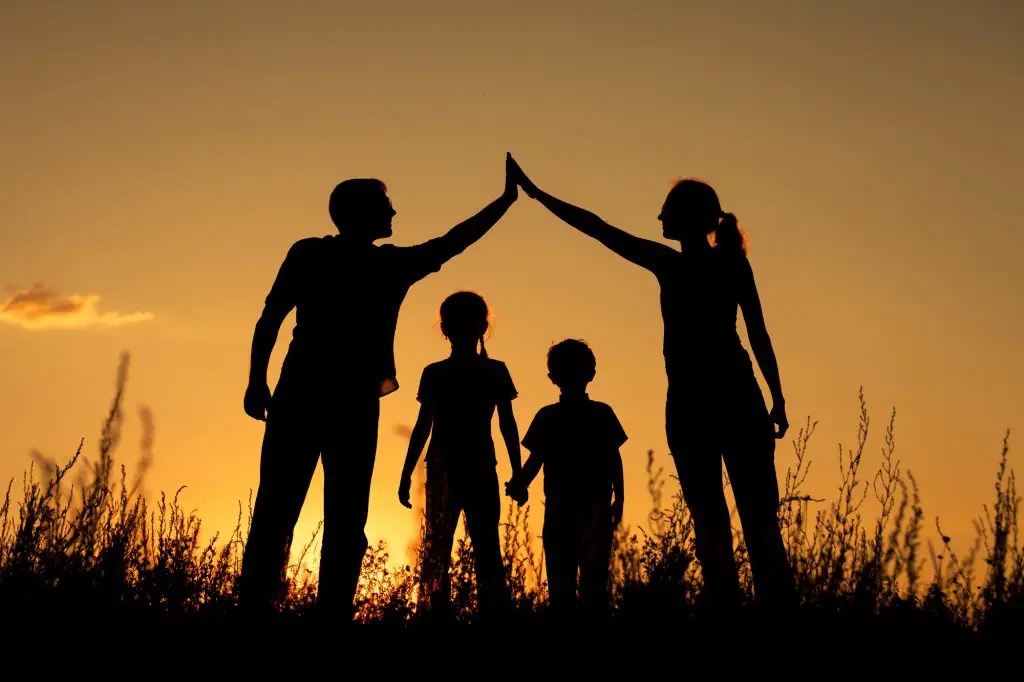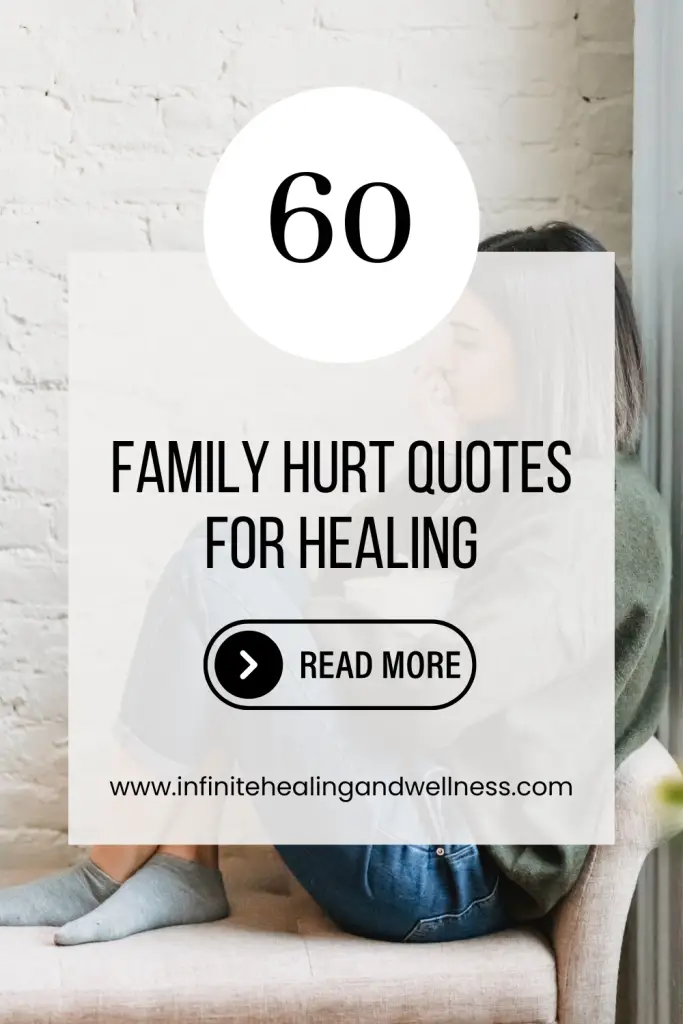60 Family Hurt Quotes for Healing
60 Family Hurt Quotes for Healing


When we think of family, we often imagine unconditional love, belonging, and the warmth of shared connection. It’s the ideal of a picture-perfect family to which we hold on. However, the truth that many of us face is that family relationships can also be sources of deep emotional pain – and instead of warmth, we are met with grief and despair. The ache of a complex family system is profound because it comes from those we expect to protect and unconditionally love us. It’s a form of pain that is felt deeply and can leave us with mixed emotions as we navigate the healing process.
We sometimes turn to words that resonate with our experiences in our search for healing and understanding. Family hurt quotes are unifying because they articulate our complex emotions when dealing with family conflicts or estrangements. These quotes validate our feelings and help us feel less alone in our struggles – or, at a minimum, bring us to a place of acceptance.
Quotes about family hurt often mirror the personal experience of many toward healing and finding peace. They remind us that while our relationships with family members can shape us, they don’t have to define or negatively consume us. Understanding the impact of toxic family dynamics allows us to find the strength to establish healthy boundaries and move forward in our healing.
Brief Overview of the Impact of Family Hurt
Our family is responsible for our earliest experiences and relationships, so negative dynamics within the family unit can profoundly affect us. The pain can linger and impact our psyche.
From conception, we are ‘taking in the world’ around us. Epigenetics in a nutshell. Our parents’ emotions, especially our mothers while in utero, affect us on a cellular level. Our parents observe the role of our protectors, confidants, and nurturers – so what happens when this isn’t the case?
Importance of Healing and Finding Solace
We must work towards healing, as holding the weight of our hurts can affect our growth, happiness, and health. Finding words that we can resonate with as we heal – serves as a reminder that we are not alone in our pain.
Introduction to the Collection of 60 Family Hurt Quotes
In this read, I have compiled 60 heartrending quotes to acknowledge the pain and offer solace. These quotes are thoughtfully placed to offer shared experiences, providing compassion and perspective.
Common Causes of Family Hurt
Family hurt often stems from a disruptive childhood, but this may not always be true. In adulthood – miscommunications, misunderstandings, or differences in beliefs and values typically contribute to family hurt. Recognizing the root of the pain can be the catalyst for finding resolution and contentment.
Acknowledging the Emotional Toll on Individuals
Acknowledging the emotional toll of family hurts grants us the permission to accept the impact of the family hurt – honoring our feelings and moving toward healing and forgiveness.
60 Family Hurt Quotes for Healing
This section will explore quotes that articulate these feelings and offer healing words.
Quotes on Forgiveness and Reconciliation
When we face conflict within our families, healing often begins with forgiveness and reconciliation. Here are some profound quotes that capture the essence of mending familial bonds:

“Forgiveness is mandatory – reconciliation is optional.” – Lysa Terkeurst
“To forgive is to set a prisoner free and discover that the prisoner was you.” – Lewis B. Smedes
“It takes one to forgive – and two to reconcile – forgiveness does not automatically mean reconciliation.” – Judy K Herman
“Forgiveness doesn’t excuse their behavior. Forgiveness prevents their behavior from destroying your heart.” – Unknown
“Forgive others not because they deserve forgiveness, but because you deserve peace.” – Unknown

“Forgiveness does not change the past, but it does enlarge the future.” – Paul Boose
“It is not an easy journey, to get to a place where you forgive people. But it is such a powerful place, because it frees you.” – Tyler Perry
“Forgiveness heals the cracks in your heart.” – Unknown
“In forgiveness, lies the key to breaking the cycle of hurt and building a stronger family unit.” – Unknown
“It is not ‘forgive and forget’ as if nothing wrong had ever happened, but ‘forgive and go forward,’ building on the mistakes of the past and the energy generated by reconciliation to create a new future.” – Alan Paton

“Forgiveness is healing, especially forgiving yourself.” – Alyson Noel
“Forgiveness is the needle that knows how to mend.” – Jewel
“Forgiveness is a virtue of the brave.” – Indira Gandhi
“Reconciliation is the fastest way to change your life.” – Mark Hart
“In family relationships, ‘love’ is really spelled ‘time,’ ‘patience,’ and ‘forgiveness’.” – Dieter F. Uchtdorf

“Forgiveness is the oil of all relationships” – Unknown
“Forgiveness is the key that unlocks the door of resentment and the handcuffs of hatred. It is a power that breaks the chains of bitterness and the shackles of selfishness.” – Corrie Ten Boom
“Forgiveness is the process of dropping off your emotional baggage.” – Tim Fargo
“Forgiveness is the means by which we bring peace to ourselves and the world.” – Marianne Williamson
“Forgiveness doesn’t excuse their behavior; forgiveness prevents their behavior from destroying your heart.” – Unknown
These insights are intended to not just provide comfort, but to help us heal our relationships and cultivate unity amongst challenges. Let’s hold them tight on our journey toward reconciliation.

Quotes on Resilience and Strength
Experiencing pain within the confines of family relationships can indeed be profound, but it often sets the stage for developing personal resilience and inner strength. Below are a few meaningful quotes that encapsulate these sentiments:

“Fall 7 times, stand up eight.” – Japanese Proverb
“I can be changed by what’s happens to me, but I refuse to be reduced by it.” – Maya Angelou
“Resilience is knowing that you are the only one that has the power and the responsibility to pick yourself up.” – Mary Holloway
“Strength is not about being invincible, but about being resilient.” – Unknown
“Strength is not about never being hurt, but about healing and moving forward.” – Unknown

“Family hurts shape us, but they don’t define us. Our resilience does.” – Unknown
“Family hurts can be deep, but so is the capacity for healing within families. It takes resilience to confront those hurts and the strength to forgive and move forward together.” – Unknown
“The strongest people are not those who show strength in front of us, but those who win battles we know nothing about.” – Unknown
“Family hurts may scar, but they also strengthen. Resilience is born from adversity.” – Unknown
“When family hurts run deep, remember that resilience is your power to rise above the pain and rebuild the bonds that were broken.” – Unknown

“Tough times don’t last; tough people do.” – Robert H. Schuller
“Courage doesn’t always roar. Sometimes courage is the quiet voice at the end of the day saying, ‘I will try again tomorrow.'” – Mary Anne Radmacher
“Strength grows in the moments when you think you can’t go on but you keep going anyway.” – Unknown
“Resilience is accepting your new reality, even if it’s less good than the one you had before. You can fight it, you can do nothing but scream about what you’ve lost, or you can accept that and try to put together something that’s good.” – Elizabeth Edwards
“Life’s storms may shake us, but they cannot break us if we stand firm in our resilience and strength.” – Anonymous

“Smooth seas do not make skillful sailors.” – Robert H. Schuller
“The oak fought the wind and was broken, the willow bent when it must and survived.” – Robert Jordan
“The human capacity for burden is like bamboo – far more flexible than you’d ever believe at first glance.” – Jodi Picoult
“Strength doesn’t come from what you can do. It comes from overcoming the things you once thought you couldn’t.” – Rikki Rogers
“When family hurts weigh heavy on your heart, remember that resilience is your compass guiding you through the storm. With strength and determination, you will find your way to calmer seas.” – Unknown

“The only way out is through.” – Robert Frost
“Family hurts may wound us deeply, but they also cultivate the resilience needed to rise above the pain and rebuild stronger bonds.” – Unknown
“The scars from family hurts are reminders of battles fought, but they also signify the resilience and courage it took to overcome them.” – Unknown
“Adversity reveals the true strength of our character and the depth of our resilience.” – Unknown
“The greatest glory in living lies not in never falling, but in rising every time we fall.” – Nelson Mandela
By adopting these quotes, we reflect on the dual nature of family relationships — where pain may exist, but so does the potential for extraordinary resilience, strength, and healing.

Quotes on the Importance of Self-Care
Self-Care, while always imperative, is important when navigating complicated family dynamics as it allows for us to nurture our well-being – and serves as a reminder that we matter too. This section explores valuable quotes that remind us to prioritize ourselves always, but especially in moments of great turbulence.

“Taking care of yourself doesn’t mean me first, it means me too.” – L.R. Knost
Reflection: In the family context, caring for oneself isn’t selfish. It’s an inclusion, a necessary step to ensure that we are present and can engage with others effectively.
“An empty lantern provides no light. Self-care is the fuel that allows your light to shine brightly.” – Unknown
Reflection: Like a lantern, we must refuel; self-care is vital in ensuring we have the energy to navigate family hurts without dimming our light.
“Self-care is giving the world the best of you, instead of what’s left of you.” – Katie Reed
Reflection: Amidst family hurts, we may neglect our well-being. If we prioritize self-care, we can maintain well-being while replenishing our reserves – allowing us to show up for others with more capacity.
“Rest and self-care are so important. When you take time to replenish your spirit, it allows you to serve others from the overflow. You cannot serve from an empty vessel.” – Eleanor Brownn
Reflection: We cannot pour from an empty cup. We must put our oxygen masks on first to better serve others or face difficult situations. Taking care of ourselves isn’t selfish.
“Self-care is not self-indulgence; it is self-preservation.” – Audre Lorde
Reflection: If we are facing complicated family dynamics, it’s common to place our needs on the back-burner. By caring for ourselves, we are equipped to care for others and face challenges with grace and resilience.

“You yourself, as much as anybody in the entire universe, deserve your love and affection.” – Buddha
Reflection: You matter, too. Often, family hurts can erode our sense of self-worth. Remember to show yourself love, compassion, and grace.
“Self-care is a deliberate choice to gift yourself with people, places, things, events, and opportunities that recharge our battery and promote whole health—body, mind, and spirit.” – Laurie Buchanan
Reflection: Seek experiences, places, and activities that nourish your soul and sense of well-being – this is one of the more important aspects of self-care. When we are fulfilled, we have optimal dopamine, allowing us to navigate situations with a clearer mindset.
“You can’t pour from an empty cup. Take care of yourself first.” – Unknown
Reflection: Just as a flight attendant tells us to mask up first, we must also fill our cups first. We cannot give what we don’t have. Remember to check in on your capacity, so you have the strength and energy to navigate the family system.
“Self-care is how you take your power back.” – Lalah Delia
Reflection: Caring for ourselves is an empowering act. This reminds us, and others, that we value ourselves. If we face familial conflict, it’s a radical act to care for ourselves.
“When you recover or discover something that nourishes your soul and brings joy, care enough about yourself to make room for it in your life.” – Jean Shinoda Bolen
Reflection: Family hurts might consume our hearts and life. Making room for experiences that uplift and rejuvenate us contributes to our resilience and overall well-being.

“Self-care is not a luxury; it’s a necessity for optimal living.” – Cheryl Richardson
Reflection: Despite the demands of family hurts, self-care remains essential for maintaining balance and vitality.
“Caring for myself is not self-indulgence; it is self-preservation, and that is an act of political warfare.” – Audre Lorde
Reflection: Caring for ourselves signifies a declaration of our inherent worth – and is an empowering act of self-care.
“The love and attention you always thought you wanted from someone else is the love and attention you first need to give to yourself.” – Bryant McGill
Reflection: It’s common to seek validation from external sources, but the most important act of love and self-care is to seek our validation – knowing that how we perceive ourselves shouldn’t be placed in the hands of others.
“Self-care is giving yourself permission to pause.” – Cecilia Tran
Reflection: When facing complex family dynamics, we must pause. The answers are in the silence.
“Self-compassion is simply giving the same kindness to ourselves that we would give to others.” – Christopher Germer
Reflection: We can only go as deep with others as we can with ourselves. Self-compassion is one of the quicker ways we can heal our hearts and move forward toward growth and healing.

Practical Tips for Healing
Navigating the emotional landscape of family hurt is challenging, but with practical steps, we can begin the journey toward healing. Here are some effective strategies to help us address the pain and mend our relationships.
Expert Advice on Navigating Family Hurt
Open dialogue is one of the best ways to navigate a complicated family dynamic. Open dialogue may include setting boundaries – which creates space for reconciliation. It may also involve seeking professional guidance from a therapist, who can assist us in creating a structured path to address these complex emotions.
Strategies for Fostering Communication and Understanding
To create space for healthy communication, we should strive to listen actively and speak from a place of honesty. This ensures everyone has space to share their perspectives in a safe environment. We can benefit from:
- Intimate family meetings to discuss issues
- Using “I” statements to express feelings without placing blame
- Listening with the intent to listen, not to respond
Encouragement for Personal Growth and Resilience
Amidst family conflicts, we often wonder how we will move on – or what the future holds. We must remember that we will be okay. Knowing this allows us to focus on ourselves and gives us the space and time to heal and adapt to a new normal. Here’s how we can encourage this growth:
- Shared connection with people in our innermost circles
- Practicing self-care – such as mindfulness activities
- Setting personal goals that reflect our values and desires
- Seeking experiences and activities that nourish our soul
During our search for personal growth and resilience, we work towards healing the hurt in our families and empower ourselves to thrive in the face of adversity.

Inspiring Stories of Family Healing
Family healing is a journey of transformation and hope. In our article, I share compelling stories illuminating the path to reconciliation, reminding us all that even the deepest wounds can find closure.
Real-Life Examples Showcasing the Possibility of Reconciliation
Healing After Estrangement: Healing after estrangement requires immense internal work and collaboration, but it is possible. Months ago, I was in a sea of betrayal, severed from my brother. I felt angry and bitter and felt there was no possible course of action for reconciliation. In the following months, while having no contact, I chose to take this information to my therapist and work on it in therapy – but this alone didn’t fix the pain and disconnection I felt. Then, I decided, with much introspection, that I didn’t want to feel this way anymore. After turning inward, I noticed that while I can’t change what happened – I can choose not to be reduced by it.
Through introspection and forgiveness, I began to mend the fractures in our relationship. Today, as I reflect, I’m reminded that the path to healing after estrangement is not linear or fixed but possible.
Rebuilding Trust: Although my brother and I had made amends, I felt conflicted about rebuilding trust with him. Through consistent communication, empathy, and a willingness to let go of past mistakes, I gradually restored trust where I believed it was once lost.
Shared Healing through Therapy: Thankfully, amid our estrangement, we both sought a therapist’s help to navigate the situation more effectively. With time, professional help, and inspiration from reading(s), we were able to mend the broken bond and heal our relationship.
Ultimate Takeaway’s
Discovering the path to healing after being hurt by family is a profound journey that begins with understanding the quotes that resonate with our experiences and ends with sharing our stories to help others.
Recap of the Significance of Healing from Family Hurt
Healing from family hurt is crucial because it involves overcoming the most profound wounds inflicted by those closest to us. Recognizing the significance of healing can empower you to seek resolution and peace.
Final Thoughts on the Transformative Journey to Emotional Well-Being
Your journey toward emotional well-being is transformative—it’s about breaking free from the pain and allowing the growth that comes from such trials. Reflecting on quotes that articulate this pain can guide you to a place where toxic ties no longer define your emotional reality.
Invitation for Readers to Share Their Own Experiences and Insights
You’ve seen how words can mirror your hurt and aid in your healing. Now, it’s your turn to offer guidance. Please share your experiences to light the way for those still navigating their paths to healing from family hurt. Your insight could be the beacon that guides someone to safer shores.

About the author
Taylor O’Horo, Marketing Specialist, Biofeedback Technician, Administrative Logistics, Psychology Major.

Hi! I am Taylor O’Horo, marketing specialist, biofeedback technician, and administrative assistant. I am a mom to three kiddos – a first responder wife and Veteran spouse. I currently am working toward my BA in Psychology – with the intention to earn my master’s in counseling. Everyone has a story, and I am no different. Overcoming the adversities, I’ve experienced has helped me to learn more about resilience and how to be there for others. I believe all humans can heal and look forward to joining you on your journey!
Frequently Asked Questions
We understand that navigating the complex emotions of family conflicts can be challenging. Below, we address some common queries with sensitivity and support in mind.
How can one cope with the deep emotional pain caused by family members?
Coping with pain caused by loved ones involves a tremendous amount of self-care. Therapy, mindful practices, and time serve as antidotes to healing. It’s important to remember we heal best in connection; we don’t have to go at it alone. If family is not a viable resource, we can build a community outside of that in the people we choose.
Are there any comforting quotes from the Bible about family and hurt?
We can find quotes in scriptures such as, “Bear with each other and forgive one another…” pointing to the value of forgiveness and endurance through family struggles.
What is the best advice for handling feelings of being hurt by a family member?
We advise communicating your feelings honestly yet respectfully and setting healthy boundaries. Prioritizing your well-being and seeking professional guidance when needed is also crucial.
Can humor in quotes alleviate the pain of family conflicts?
Humor can be a balm for easing tensions, as it allows for a light-hearted perspective amidst the complexity of family dynamics.
How should one deal with the impact of toxic relationships within the family?
Dealing with toxic family relationships may involve distancing oneself, creating boundaries, or seeking external support to ensure a healthy environment for personal growth – assuming repair isn’t an option.





